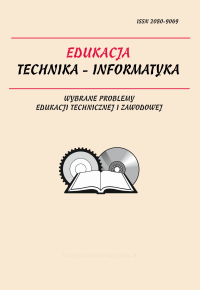“Kockalica” (cubes) – didactic and manipulative teaching resource in methodology of developing mathematical concepts in kindergarten
Słowa kluczowe:
the initial formation of mathematical concepts, kindergartens, didactic, manipulative and classroom teaching resource, a wide range of applicationsAbstrakt
For the purposes of the academic course entitled Methods of Initial Formation of Mathematical Concepts, we created a didactic and manipulative pro-duct “Kockalica” (cubes) which is applicable in about 50 school lessons. These findings have come out as a result of numerous submitted seminar works, prepared teaching resources, activities and simulation tasks developed by students of College of Vocational Studies in Subotica. During the implementation of the final exams and professional development sessions in kindergartens, this didactic resource has been implemented in a number of educational topics. The conducted survey, developed by our students and kindergarten teachers, indicates the usefulness and applicability of “Kockalica” (cubes) in the acquisition of mathematical concepts in children of this age. In the process of shaping of this simple and widely applicable teaching resource, Braille script has been carved onto the surface, making it more accessible for visually impaired and blind children. The aim of the paper is to present an innovative teaching resource “Kockalica” (cubes) to a wider range of potential users and practitioners.Pobrania
Opublikowane
2014-06-30
Jak cytować
HILCENKO, S. (2014). “Kockalica” (cubes) – didactic and manipulative teaching
resource in methodology of developing mathematical
concepts in kindergarten. Journal of Education, Technology and Computer Science, 9(1), 528–535. Pobrano z https://journals.ur.edu.pl/jetacomps/article/view/6710
Numer
Dział
PSYCHOLOGICZNE ASPEKTY EDUKACJI SZKOLNEJ
Licencja
Prawa autorskie (c) 2014 Journal of Education, Technology and Computer Science

Utwór dostępny jest na licencji Creative Commons Uznanie autorstwa – Na tych samych warunkach 4.0 Miedzynarodowe.

